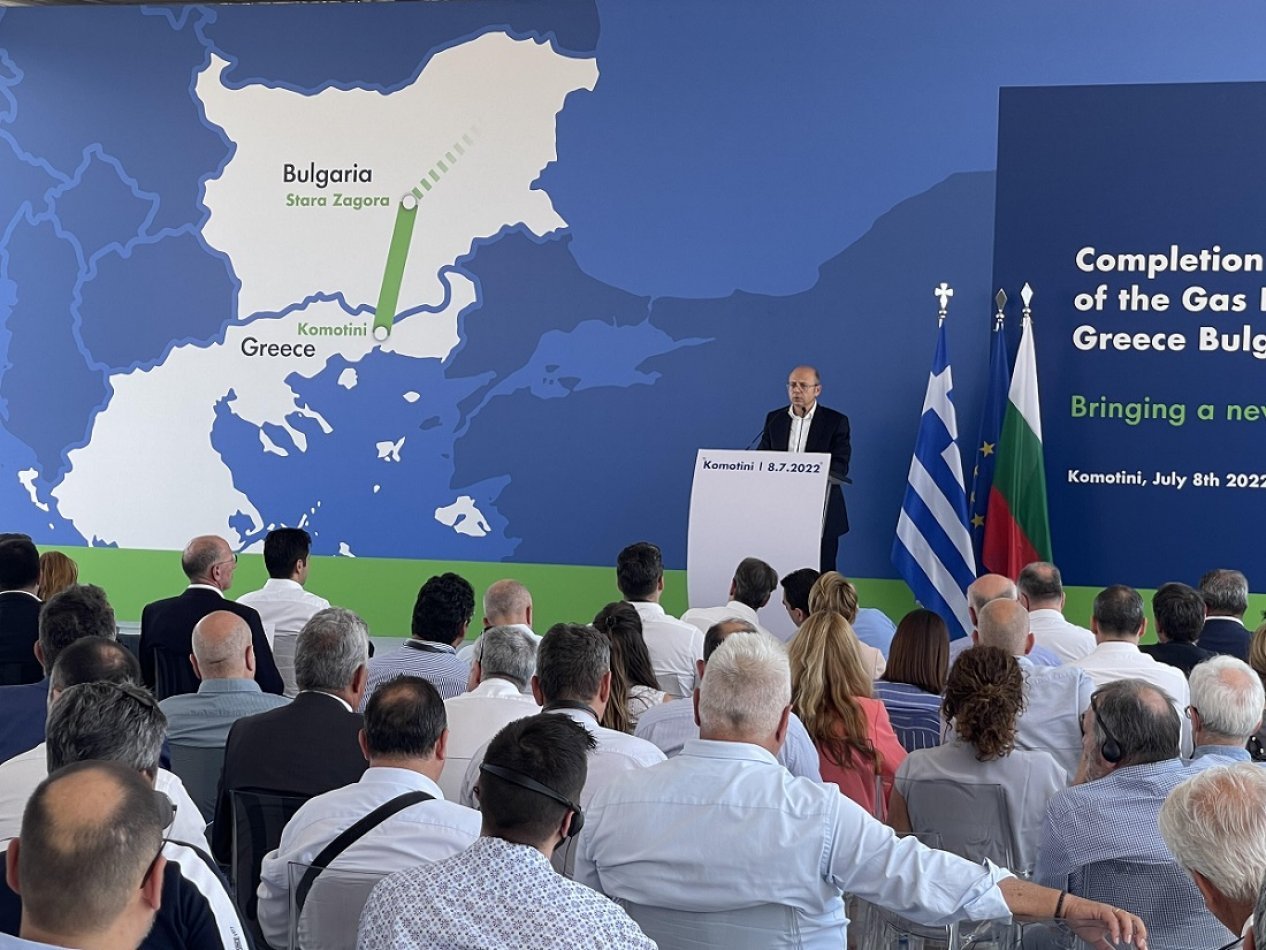
The article entitled "Bulgarian journalists have revealed a gas conspiracy against Azerbaijan and Ukraine" published by the website "Haqqin.az" with reference to the Bulgarian independent publication "Bird" made allegations that the Bulgarian government took steps against the economic interests of Ukraine and Azerbaijan.
It is noted that the Bulgarian government ensured Russia's economic interests by allowing the Balkan Stream gas pipeline to pass through its territory a few years ago, and at the same time, this decision led to the exclusion of Ukraine from the European gas transportation network. As a result, the position of Ukraine as a transit country has been undermined.
Quote: "The independent Bulgarian newspaper Bird published a sensational investigation that referred to specific facts about the criminal conspiracy of the former Bulgarian authorities with Russia's Gazprom company. In 2016, after Russia abandoned the multibillion-dollar South Stream project, then-Bulgarian Prime Minister Boyko Borisov floated the idea of a Balkan Stream gas pipeline for Bulgaria and Serbia to access Russian gas. That is, bypassing Ukraine."
How well-founded can these accusations be?
First, let's give brief information about the Balkan Stream project. This project, one of the routes transporting Russian gas to Central-Eastern Europe, became relevant in 2015-2016 after the importance of the South Stream project decreased and Moscow abandoned this pipeline. At that time, Serbia and the Balkan countries mainly transported gas through the Russia-Ukraine pipeline. Cold relations between Moscow and Kyiv since 2008, continuous blocking of the Ukrainian gas pipeline and other tensions have undermined the profitability of gas flows to Central Europe and the Balkans. For this reason, Russia proposes to expand the Turkish Stream project, which existed at that time, and to build the Balkan Stream as a continuation. The new pipeline was supposed to provide fuel exports to Greece, North Macedonia, Romania, Serbia, Bosnia and Herzegovina by passing through the territory of Bulgaria. Thus, the Balkan Stream gas pipeline, a continuation of the Turkish Stream project, enters the energy geography of Europe. (source)
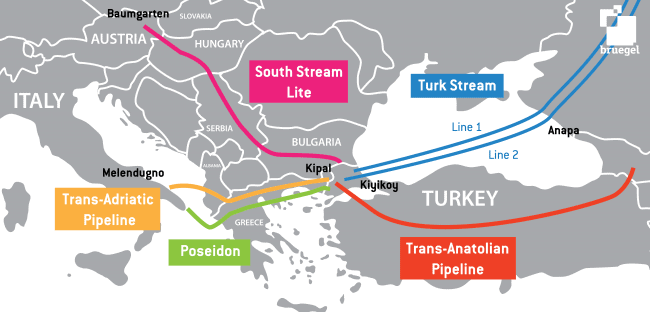
Some countries tried to present the project as an anti-Ukrainian policy, as this project bypassed the territory of Ukraine and envisaged bringing Russian gas to Serbia and the Balkans. However, considering important factors such as closer distance, affordability and low transit prices in the diversification of energy routes, it is inappropriate to look for any political meaning in Serbia or Bulgaria agreeing to the construction of a new pipeline. For example, at that time, when the price of gas was $400 per 1,000 cubic meters, Serbia could save at least $70 per thousand cubic meters of fuel. Or, due to the passage of this pipeline through its territory, the Bulgarian government could receive a relatively large amount of transit fees. It would certainly be naive to expect that the Prime Minister of Bulgaria, Boyko Borisov, could go against this project at that time.
On the other hand, the Bulgarian parliament ratified the legal documents related to the construction of this project. It goes without saying that this project, which was approved 2-3 years ago, was realized with the approval of the European Union and the EU Energy Commission. Considering that Austria could also benefit from the opportunities of the pipeline, the project was also in the interests of Western Europe.
After nearly two years of construction and infrastructure provision, in July 2021, Serbia and Hungary completed a large part of the Balkan Stream gas pipeline and connected the pipeline to Hungary's gas transmission system. From October 1, gas is transported to Central Europe via Serbia. Thus, the transportation of Russian gas through Turkiye (bypassing Ukraine) to Central Europe and the Balkans is ensured. Here, Bulgaria is one of the transmitting countries. (source)
From this point of view, the opinion that Bulgaria, by joining the Balkan stream, serves the economic interests of Russia and violates the European Gas Directive, excludes Ukraine from Europe's gas export geography and deprives it of transit revenues, is unfounded.
First, several years before the Russia-Ukraine war, all European Union countries were Russia's close energy partners, and after 2010, Western European countries supported the construction of 4-5 pipelines put into use in this region. From this point of view, there was nothing wrong with Bulgaria's inclusion in the Balkan stream, nor was there any political motive or interest. If buying or transporting Russian gas is considered a violation of EU directives or treason, then each of the 30 EU countries should be charged equally.
Secondly, the European Union had signed more than ten agreements on gas transportation with Russia before the Ukrainian war. Forty-five percent of the EU's gas supplies came from Russia. According to this logic, Germany, Poland, Austria, Italy, Spain and other countries should be at the top of the "guilty list."
Thirdly, if the Balkan stream is a "conspiracy" against Ukraine, what is the other alternative to the Russian-Ukrainian gas pipeline, the Yamal-European pipeline, which provides gas flow through the territory of Poland and Germany to Europe? According to this approach, the German company Gascade, a close partner of Gazprom, should be considered a "traitor" by the EU. Or, Gas Hub Baumgarten, which transports more than 12 billion cubic meters of natural gas of Gazprom per year through Hungary, should be considered a participant in the "conspiracy" against Ukraine.
What should we call Gazprom's Negru Voda II and Negru Voda III systems extending to Romania? And Russia's Kulata-Sidirokastro transport system supplying Greece? Maybe we should call these projects of Western Europe "suicide projects" against Ukraine. If Ukraine as a transit country was removed from the transit market of the EU family, it was carried out not only by the will of Russia, but also with the joint participation of the EU states with their interests. Gazprom supplied gas to Western and Eastern Europe mainly via Poland, Hungary, and Germany.
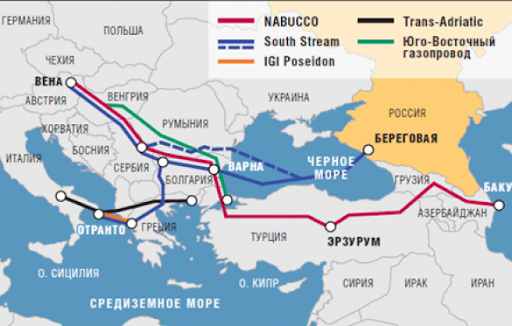
Let's not forget that when Russia was transporting gas to Europe from several directions and conducting heated discussions about new routes, it was the Bulgarian government that did not allow the Kremlin to build the planned undersea pipeline through its territory. It was after this position of the official Sofia that Russia stopped the South Stream gas pipeline project
Allegedly, Borisov called this project Balkan Stream to avoid US sanctions. The project covers the Balkan region, as seen from its geographical boundaries. In that case, was it supposed to be called the Gibraltar, Mozambique, or Dominican Stream? How can there be such a ridiculous assumption? On the other hand, if there was talk of US sanctions at that time, why is Berlin not considered an object of condemnation because of the Russia-Yamal-Germany pipeline?
As for the issues related to Azerbaijan, Borisov's government delayed the construction of the Bulgarian part of the Southern Gas Corridor under various pretexts and created artificial obstacles, thereby organizing 'conspiracies' against Azerbaijan. Quote: The Bulgarian government has also delayed the Bulgarian part of the TAP pipeline (Greece-Bulgaria Gas Interconnector), the last transmission line of the Southern Gas Corridor, authored by Azerbaijan, by preferring the Balkan Stream route. Thanks to this policy, the gas 'conspiracy' was carried out against both Ukraine and Azerbaijan."
Of course, these claims have no basis. It is enough to look at the history of the past ten years to see that the official Sofia showed a strong political will to buy Azerbaijani gas by choosing the Southern Gas Corridor project from the first day. Even before the emergence of the Balkan Stream, when the idea of the Southern Gas Corridor appeared in 2011, official Sofia was one of the first supporters and declared its intention to buy gas from Azerbaijan. On January 13, 2011, Azerbaijani President Ilham Aliyev and European Commission Chairman Jose Manuel Barroso signed the "Joint Declaration on the Southern Gas Corridor" in Baku.
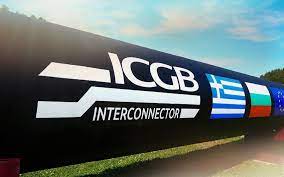
The Bulgarian government, having welcomed the Declaration, was the strongest supporter of the Southern Gas Corridor, and the then Prime Minister of Bulgaria, Boyko Borisov, who stood until the end for his country's participation in this project, insisted that the Southern Gas Corridor was of great importance for his country in 2015, when the idea of the Balkan Stream was still unknown. Boyko Borisov's views on the transportation of Azerbaijani gas at all European Union events and international energy forums are like a "red line". Mr. Borisov confidently said that thanks to the gas flowing from the Caspian, the fuel resources of the Balkan gas reservoir would be formed, and as a result, Bulgaria itself would become the leading gas transit country of South-East and Central Europe.
The President of the Republic of Bulgaria, Rumen Radev, who visited Azerbaijan in October 2017, also expressed his country's determination to implement the Southern Gas Corridor project. Quote: "We confirmed mutual interests in the development of transport and gas corridors between Asia and Europe. Our countries have a strategic position in the region, and we should use all the opportunities this position offers."
Speaking at the VII Global Baku Forum held in Azerbaijan on March 14, 2019, Boyko Borisov highly valued the transfer of a part of the Azerbaijani gas to be transported to Europe through the Southern Corridor to Bulgaria. "We think Azerbaijani gas will contribute to the prosperity of Bulgaria's economy."
On the eve of the launch of TAP, that is, ten days before the transfer of Azerbaijani gas to Europe (in December 2020), Boris Borisov declared at a government meeting that the entry of Azerbaijan into the European gas market opened a new door for them. Quote: "The agreement with Azerbaijan is an extremely important contract, which is related to the implementation of our priorities – the diversification of natural gas supplies. This will give us the opportunity to get a new source for Bulgaria from December 31 this year."
Thus, the official Sofia put all its efforts into the construction of the Southern Gas Corridor and its central part, the Trans-Adriatic Pipeline (TAP), and put all effort into completing the Bulgarian part of the TAP (Greece-Bulgaria Gas Interconnector) on time.
TAP was put into operation on December 30, 2020, and Azerbaijani gas began to be transported to Europe. Could the Bulgarian part of the pipeline be operational when TAP was not fully ready, i.e., in 2017-2020? Of course, this fact itself negates the claims about the delay of the Bulgarian part of the pipeline.
Secondly, TAP is a joint project of Azerbaijan with the European Union, and the supervision of the construction and operation of all parts of this pipeline was carried out by the EU and the Southern Gas Corridor Advisory Council. A few years after the signing of the Declaration on the construction of the Southern Gas Corridor, the Southern Gas Corridor Advisory Council was established to ensure gas supply to Europe. All the countries represented in this organization, including Bulgaria, have taken technical obligations regarding the implementation of the Southern Gas Corridor. That is, the execution of work on this project was continuously monitored. It has been noted which country should do which work according to the schedule. In such a case, it does not seem credible that Bulgaria opposes the obligations of the Southern Gas Corridor Advisory Council and the European Commission, allowing artificial delays.
Thus, after TAP became operational in 2021 with full transmission capabilities, Greece made its infrastructure functional, and the work on the last pipeline segment, the Greece-Bulgaria Gas Interconnector (IGB), was completed in 2022.
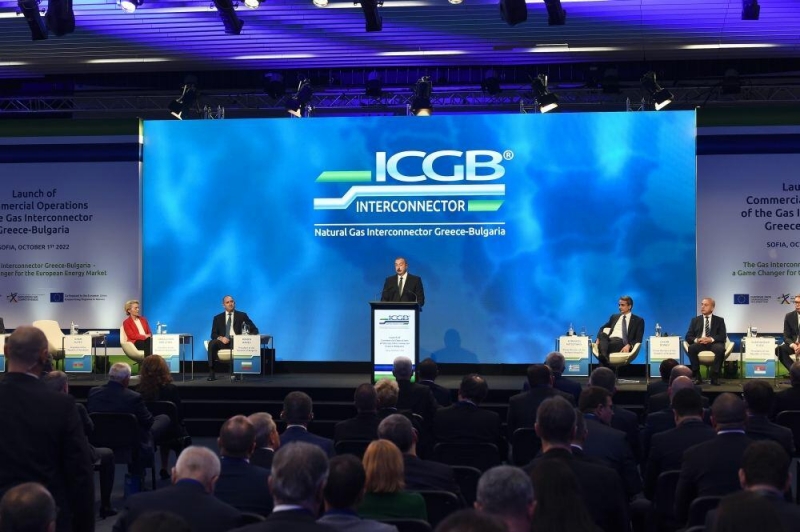
In July 2022, the Greece-Bulgaria Gas Interconnector, which transmits gas to Bulgaria through the TAP pipeline, was fully completed, and on October 1, the Transmission Network was commissioned with the participation of Azerbaijani President Ilham Aliyev. European Commissioner for Energy, Kadri Simson, hailed Bulgaria for its commitment to the Southern Gas Corridor and the completion of the IGB project. Quote: "The IGB can provide much-needed alternatives and flexibility for Bulgaria and the whole region. This new route will help to strengthen security of supply to the region, including the Western Balkans, Ukraine, and Moldova. I would like to congratulate the Greek and Bulgarian governments and the project company ICGB for opening the pipeline today. It is a remarkable milestone of regional cooperation."
Matthew Bryza, the former US Deputy Secretary of State for European and Eurasian Affairs, spoke about the importance of the IGB and said that Sofia defended the EU's energy policy until the end.
Apparently, all the facts we have listed confirm that the Bulgarian government duly fulfilled its duty in the Southern Gas Corridor until the end and never violated its mission and obligations regarding the transportation of Azerbaijani gas.




















